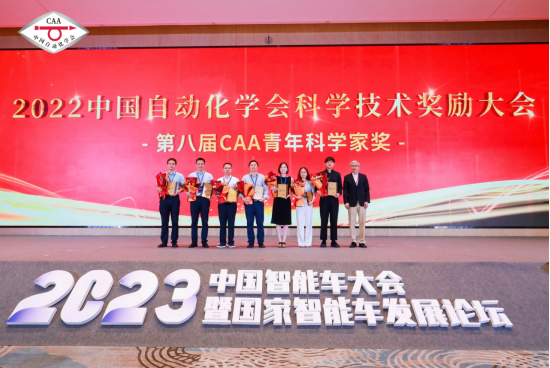On July 2nd, the 2022 China Association of Automation Science and Technology Award Conference was held in Guangzhou. Professor Zhang Yonggang from the School of Intelligence was awarded the 8th China Association of Automation Young Scientist Award, marking the first time our school has won this award. Professor Zhang Yonggang has long been engaged in research on navigation technology and has done a lot of work in the fields of navigation devices, navigation algorithms, and information fusion. His series of academic achievements have been published in top academic journals in the field of navigation and control, such as IEEE Transactions on Aerospace and Electronic Systems (IEEE TAES), IEEE Transactions on Automatic Control (IEEE TAC), and have won the IEEE Barry Carlton Award for Best Paper The first prize of the Natural Science Award of the Chinese Society of Automation and four other provincial and ministerial level scientific and technological awards have received widespread attention and praise from both domestic and foreign researchers. The Young Scientist Award of the Chinese Society of Automation was established in 2015, aiming to motivate young scholars in automation related fields to make important contributions and outstanding achievements in science, technology, or social services, promote social progress, and promote the growth of young talents.


At the 2022 working conference of China Association of Automation, the conference heard the bidding statement of Harbin Engineering University on China Automation Conference. After voting by all the directors, Harbin Engineering University finally won the right to host the 2025 China Automation Conference. At the initiative of older scientists such as Qian Xuesen, Shen Shangxian, Zhong Shimao, Lu Yuanjiu, Lang Shijun, etc., the Chinese Society of Automation was officially established on November 27, 1961. Qian Xuesen was the first president of the Society. The China Automation Conference is the top-level comprehensive academic conference in the field of automation, information, and intelligence science, organized by the China Association of Automation. Since its establishment in 2009, the conference has traveled to Hangzhou, Beijing, Changsha, Wuhan, Jinan, Xi'an, Shanghai, Kunming, Xiamen and other places, gathering over 50 academicians from the Chinese Academy of Sciences and Chinese Academy of Sciences, attracting numerous high-level talents such as discipline leaders and entrepreneurs, and receiving widespread attention and support from scientific and technological workers in the field. The China Automation Conference has become one of the most influential academic events in the fields of automation, instrumentation, aerospace, artificial intelligence, network security, intelligent manufacturing, and other fields in China. It is a high-end academic platform for experts, scholars, and colleagues in the global automation, information and intelligence science fields to showcase innovative achievements and look forward to future development.
The China Automation Conference aims to enhance academic exchanges among workers in the field of automation in China, provide a national academic exchange platform for young scholars, strengthen mutual learning and cross integration between different disciplines and majors, and provide good opportunities for promoting the development of local national economy. The holding of the China Automation Conference helps to enhance the cohesion of the domestic automation industry, expand the social impact of automation disciplines on different regions at the national level, and drive the development of automation disciplines in various regions.
Harbin Engineering University will take the opportunity of hosting the 2025 China Automation Conference to serve the national strategy, lead by advantageous disciplines, focus on automatic control, instrumentation, aerospace, artificial intelligence, network security, intelligent manufacturing and other fields, give play to the advantages of traditional characteristics, promote the organic linkage and cross integration of different disciplines, and further focus on cutting-edge technology and disruptive technological innovation in automation and intelligence fields, Promote social development.
